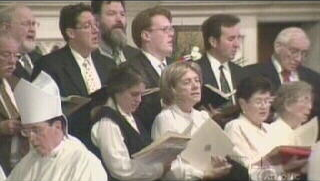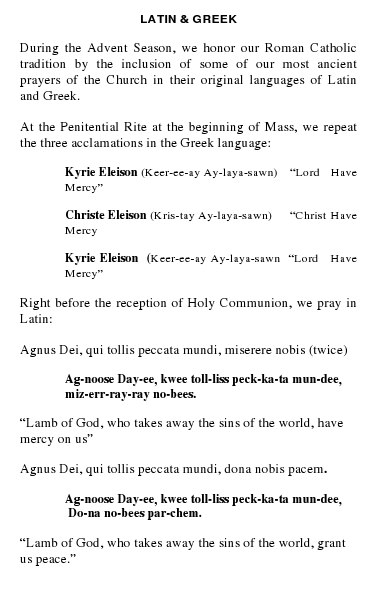Sacred Music magazine has an informative article by Laszlo Dobszay. His "Critical Reflections" (PDF) describe the historic structure of the Roman Office, and explain how reform efforts over the past centuries turned it from a liturgy meant for choral celebration into a book for priests to read.
Liturgy and Music: December 2006 Archives
Prof. Bill Mahrt (music, Stanford) has proposed some ways for the US Catholic Bishops to improve sacred music in this country by improving their coming document on the subject. Along the way, he cuts through numerous confusions about the music of the Mass.
(Thanks, Amy.)
ACI Prensa has this on the upcoming liturgical documents.
(NB: this is my own off-the-cuff translation of the Spanish. Caveat lector.)
Motu Proprio after Christmas, Apostolic Exhortation in January
ACI NEWSROOM, 14 Dec. 06 (ACI).- Sources in the Vatican tell ACI Prensa that the Motu Proprio by which Pope Benedict XVI will grant a universal indult for the Missal of St. Pius V may be published after Christmas; furthermore, the Post-Synodal Apostolic Exhortation on the Eucharist will see light in the middle of January.
The sources confirm the press statement by Cardinal Jorge Medina Estévez, who recently participated in the meeting of the "Ecclesia Dei" Commission –charged with dialogue with the Lefebvrist schism– in which the final version of the text of the Motu Proprio was revised.
The indult is said to allow the Mass of St. Pius V to be celebrated freely, without the current requirement of explicit permission from the local bishop. The Motu Proprio, however, does not deal with the canonical issue of the Society of St. Pius X, the schismatic organizatión created by Mons. Marcel Lefebvre.
The Apostolic Exhortation on the Eucharist, according to the same sources, has been completed by Pope Benedict XVI and is in the process of translation into the various languages in which it will be published.
The text, which will see the light after January 15, say the sources, reaffirms a "no" for married priests, promotes the use of Latin in liturgical celebrations, and also asks that seminarians learn the use of that language.
The text also supports the recovery of Gregorian chant and polyphonic sacred music in place of modern music, which would imply a gradual removal of musical instruments "inadequate" for the solemnity and reverence of the Eucharistic Celebration.
(Tip: WDTPRS)
Tuesday at 2 p.m., two new bishops will be ordained as auxiliaries for the Archdiocese of Boston. Choirs from the Cathedral's English and Spanish communities and from the new bishops' respective parishes will join to sing these musical selections, along with a couple of pro soloists and a few extra voices responding to the APB.
(Updated with the actual order of music:)
Before the Mass:
Cesar Franck: Praise Ye The Lord (Ps. 150, ed. Treharne; very triumphal)

Also, before the Mass, a Life Teen choir sang Carey Landry's Hail Mary, and while it was nothing fancy, they really were a good assemblage of voices and sounded quite nice.
After them, a soloist did 2-3 Spanish-language religious songs, with (I was horrified) an audio accompaniment track. Karaoke time in the cathedral! And the priests' procession took place during this embarrassing performance.
Procession:
Traditional: Las Apariciones Guadalupanas
Traditional: O come, O come, Emmanuel / O ven, O ven, Emmanuel
Berthier (Taize): Kyrie
James Chepponis: Melodic Gloria
at the Responsorial Psalm: Chepponis, Magnificat
Ordination Rite:
plainchant: Veni Creator Spiritus
Chant (in English): Litany of the Saints
Offertory:
John Ireland (the 20th c. composer, not the 19th c. Archbishop): Greater Love Hath No Man
Marty Haugen: Mass of Creation (Holy, Acclamation, Amen)
(Unknown): Cordero de Dios (Lamb of God)
Communion:
Gabarain: Pescador de Hombres
Bob Hurd: Pan de Vida
Mozart: Laudate Dominum
(while the new bishops blessed the congregation)
Traditional: Holy God, We Praise Thy Name
F.X. Moreau: Tu Reinaras, a march
(The congregation went wild for the new bishops, so we had to sing three verses of the latter, twice, and it still wasn't enough.)
Recess Song: Come, Thou Long Expected Jesus -- but the text was so much changed from the original -- Heaven knows why -- I stopped trying to sing it.
PS: Boston-area cable viewers can catch reruns of the Mass on the Boston Catholic TV cable channel Tuesday, Dec 12, at 8:30 pm and tomorrow (Wed., Dec 13) at 11 a.m.
Quaeramus cum pastoribus by Jean Mouton (1459-1522): I haven't found a voice recording of the motet, but here's an audio file I made from CPDL's MIDI sample.
I'm learning it for a concert Saturday, Dec. 16, by the New England Classical Singers. We're not going to sing it at quite the pace illustrated in the audio file, but I speeded it up for John's sake. :-)
Vox Clara may have English translations of the Mass ordinary ready by summer
If you've ever attended a celebration of the Byzantine Divine Liturgy, you'll be familiar with the Litany of Peace which begins the service. A deacon sings the (more or less) twelve petitions, and the people join in each intention by responding, "Lord have mercy".
Since it is not unusual for the Latin church to borrow some of the beauties of the Eastern liturgies, I've wondered whether this litany has ever found its way into Western church books; and it has: at least recently. The 1981 Psalterium Monasticum (Monastic Psalter), p. 518, presents this Latin version of the litany (reduced to nine petitions) and authorizes its use in the Office, before the Our Father.
V. Dicamus omnes ex tota anima et ex tota mente: Kyrie eleison. R. Kyrie eleison.
V. Pro pace orbis universi, prosperitate sanctæ Dei Ecclesiæ, omniumque christifidelium unitate, Dominum rogemus. R. Kyrie eleison.
V. Pro papa N. et omni sacerdotio, Christi ministris et ascetis, cunctoque fideli populo, Dominum rogemus. R. Kyrie eleison.
V. Pro aerum temperie, fructuum terræ copia, tranquillisque temporibus, Dominum rogemus. R. Kyrie eleison.
V. Pro salute infirmorum, incolumitate viatorum, ac sublevatione pauperum et tribulatorum, Dominum rogemus. R. Kyrie eleison.
V. Pro liberatione omnis animæ christianæ a furore persecutorum et a vexatione dæmonum, Dominum rogemus. R. Kyrie eleison.
V. Pro conversione peccatorum et illuminatione errantium a fide vel non credentium, Dominum rogemus. R. Kyrie eleison.
V. Pro requie eorum qui iam dormierunt patrum fratrumque nostrorum et omnium ubique in Christo defunctorum, Dominum rogemus. R. Kyrie eleison.Et simul his qui domum hanc sanctam, cum fide, pietate, et timore Dei sunt ingressi, nostram ad Dominum precem compleamus.
Pater noster...
Here, off the cuff, is a somewhat free English version:
V. Let us say with our whole soul and our whole mind: Kyrie eleison. R. Kyrie eleison.
V. For peace in the world, the well-being of the holy Church of God, and the unity of all Christians, let us pray to the Lord. R. Kyrie eleison.
V. For Pope N. and all the priesthood, for those who serve Christ and are consecrated to Him, and for all His faithful people, let us pray to the Lord. R. Kyrie eleison.
V. For favorable weather, an abundance of the fruits of the earth, and for peaceful times, let us pray to the Lord. R. Kyrie eleison.
V. For the health of the sick, the safety of travelers, and relief to the poor and suffering, let us pray to the Lord. R. Kyrie eleison.
V. For all Christian souls, that they may be freed from the persecution of men and the vexation of evil spirits, let us pray to the Lord. R. Kyrie eleison.
V. For the conversion of sinners and the enlightenment of those who err in faith and of unbelievers, let us pray to the Lord. R. Kyrie eleison.
V. For the repose of our fathers and brothers who are now asleep and all who have died in Christ, let us pray to the Lord. R. Kyrie eleison.And also for those who enter this holy house with faith, reverence, and fear of God, let us complete our prayer to the Lord:
Our Father....
(Update: fixed three typos)
Every Advent, I get a little impetus to start saying the Office regularly, though I don't usually last long. Since it's time this evening for Vespers of the first Sunday of Advent, I figured I'd pull out some books I bought recently and give it a go.
It turns out that it's not totally easy yet, because the chant books for the Office have been published in an piecemeal fashion over the past 25 years: the psalms are in one volume (Psalterium Monasticum, 1981), the antiphons are in another (Antiphonale Monasticum, 2005), the hymns are in a third (Liber Hymnarius, 1983), and the collects are, as far as I can tell, to be sought over in the Gregorian Missal. Putting it all together requires a bit of flipping around and determination.
It's a fitful observance of Vespers, as I have to pause at times to work out the unfamiliar tunes on a keyboard. It pays to remember that the good of praying the Office does not depend on how easily it goes for us, but on the simple aims of adoring God who is worthy of all our love, and of praising him in union with Christ's mystical body, the Church present throughout the world.

